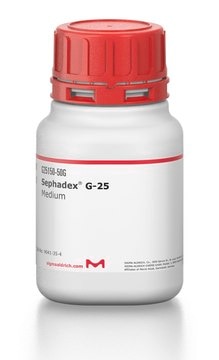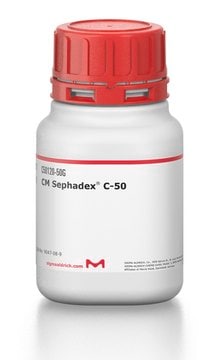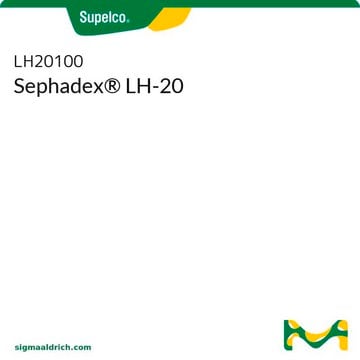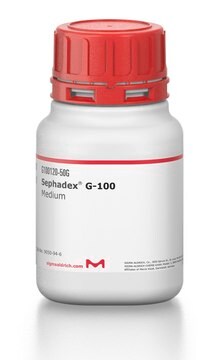C25120
CM Sephadex® C-25
Synonym(s):
CM Sephadex®, Carboxymethyl Sephadex®
Sign Into View Organizational & Contract Pricing
All Photos(2)
About This Item
Recommended Products
form
powder
technique(s)
activity assay: suitable
matrix
cross-linked dextran
bead size
40-125 μm (dry)
pore size
~30,000 Da exclusion limit
operating pH
6-10
pH
2—12
capacity
4.0-5.0 meq/g ion exchange capacity
compatibility
mode of use weak cation exchange chromatography
General description
C25120-100G′s updated product number is GE17-0210-01
Application
Sephadex® C-25 is used in ion exchange chromatography, cation exchange media, protein chromatography, separation media and resins. Sephadex® C-25 has been used to study wasp envenomation and to demonstrate that snake protease inhibitors and neurotoxic homologs originated from a common ancestor.
Legal Information
Sephadex is a registered trademark of Cytiva
replaced by
Product No.
Description
Pricing
Storage Class Code
11 - Combustible Solids
WGK
WGK 3
Flash Point(F)
Not applicable
Flash Point(C)
Not applicable
Personal Protective Equipment
dust mask type N95 (US), Eyeshields, Gloves
Certificates of Analysis (COA)
Search for Certificates of Analysis (COA) by entering the products Lot/Batch Number. Lot and Batch Numbers can be found on a product’s label following the words ‘Lot’ or ‘Batch’.
Already Own This Product?
Find documentation for the products that you have recently purchased in the Document Library.
Customers Also Viewed
Jia Lu et al.
Peptides, 29(3), 369-374 (2008-01-01)
By Sephadex G-50 gel filtration, cation-exchange CM-Sephadex C-25 chromatography and reversed phase high-performance liquid chromatography (HPLC), a novel serine protease inhibitor named bungaruskunin was purified and characterized from venom of Bungarus fasciatus. Its cDNA was also cloned from the cDNA
Cleonice C Santos et al.
Toxicology in vitro : an international journal published in association with BIBRA, 42, 54-60 (2017-04-11)
Aminochrome has been suggested as a more physiological preclinical model capable of inducing five of the six mechanisms of Parkinson's Disease (PD). Until now, there is no evidence that aminochrome induces glial activation related to neuroinflammation, an important mechanism involved
J W Adelson et al.
The Journal of biological chemistry, 261(23), 10569-10575 (1986-08-15)
Chymodenin, a hormone-like duodenal peptide which rapidly alters the proportions of secreted pancreatic digestive enzymes to a mixture relatively richer in chymotrypsinogen than that found in basal secretion, has been purified to homogeneity. The starting material was an acidic methanol-soluble
F A Stephenson et al.
Archives of biochemistry and biophysics, 234(1), 214-229 (1984-10-01)
A peptide has been extracted and characterized from whole bovine pituitaries that has anti-insulin-like activities when assayed in rat adipocytes. This peptide has been purified approximately 100,000-fold, is homogeneous by thin-layer chromatography in three separate solvent systems, and shows a
Susan M Paskewitz et al.
Comparative biochemistry and physiology. Part B, Biochemistry & molecular biology, 150(4), 403-408 (2008-06-07)
The production of melanin is a complex biochemical process in which several enzymes may play a role. Although phenoloxidase and serine proteases are clearly key components, the activity of other enzymes, including dopa decarboxylase and dopachrome conversion enzyme may also
Our team of scientists has experience in all areas of research including Life Science, Material Science, Chemical Synthesis, Chromatography, Analytical and many others.
Contact Technical Service








